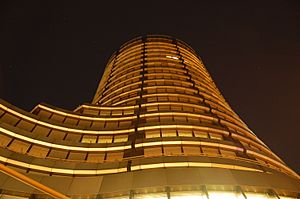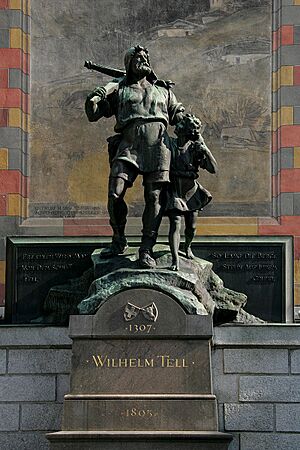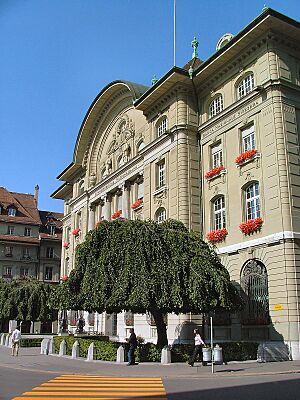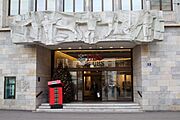Banking in Switzerland facts for kids

Banking in Switzerland started way back in the early 1700s. It grew from simple merchant trade into a huge, worldwide industry. Banking is a very important part of Swiss culture. For a long time, Switzerland has been known for its banking secrecy. This means banks keep their clients' information very private.
This secrecy began to protect money for rich Europeans. In 1934, it became a strict law called the Federal Act on Banks and Savings Banks. These laws helped protect money for people escaping from the Nazis. But sometimes, people also used these laws to avoid paying taxes or hide money from crimes.
After World War II, there was a lot of talk about changing these secret banking laws. But Switzerland mostly kept them. For many years, Switzerland was one of the biggest places for offshore banking and a tax haven. This means it was a place where people could keep money to avoid taxes in their home countries.
However, things changed in 2017. Switzerland agreed to automatically share bank account information with other countries. This applies to people who don't live in Switzerland. So, for non-Swiss residents, banking secrecy mostly ended. Also, because of an agreement with the U.S. called FATCA, some Swiss banks even stopped letting U.S. citizens open new accounts. This is because the U.S. taxes its citizens no matter where they live.
Banking secrecy still exists only for people who live and pay taxes in Switzerland.
Sharing client information has been a crime in Switzerland since the early 1900s. Bank employees were expected to keep secrets, like doctors or priests. Since 1934, only a few people have broken these secrecy laws. But as mentioned, for people who don't live in Switzerland, banks now share information automatically with foreign governments.
In 2018, the Swiss Bankers Association (SBA) said that Swiss banks held about US$6.5 trillion. This was about 25% of all global money kept across borders. Major Swiss banking cities are Geneva (for French speakers), Lugano (for Italian speakers), and Zürich (for German speakers). Switzerland is currently ranked very high for financial secrecy.
The banks are watched over by the Swiss Financial Market Supervisory Authority (FINMA) and the Swiss National Bank (SNB). Banking has always been, and still is, a huge part of the Swiss economy. The total money in Swiss banks is more than four times the country's total economic output. Swiss banking has also appeared in movies and TV shows.
In 2023, a big Swiss bank called Credit Suisse had problems and was bought by another Swiss bank, UBS. This made some people question Switzerland's banking system.
Contents
A Look Back: How Swiss Banking Began

Swiss banking secrecy started in Geneva in 1713. Back then, a council made it illegal to share information about rich European families. In the 1780s, Swiss banks started to protect deposits, making them seem very safe. In 1815, the Congress of Vienna officially declared Switzerland a neutral country. This meant it wouldn't take sides in wars, which brought a lot of money into the country.
Switzerland is a country without a coastline, but it wanted to be powerful like France or the UK. Swiss historian Sébastian Guex explained that Swiss business people thought: "We will use the disagreements between European powers. Protected by our neutrality, our strength will be industry and money."
After a small civil war in the 1840s, the Swiss Federation was formed in 1848. This new government, run by direct democracy, made the country very stable. This stability was perfect for banking secrecy. Also, Switzerland's mountains offered natural places to build underground vaults for gold and diamonds.
In the 1910s, during World War I, Swiss bankers went to France to tell people about their secret banking. The war made other countries unstable, so a lot of money quickly moved to Switzerland. As European countries raised taxes to pay for the war, rich clients moved their money to Swiss accounts to avoid these taxes. French people banked in Geneva, Italians in Lugano, and Germans in Zürich.
The Federal Act on Banks and Savings Banks, also known as the Banking Law of 1934, made breaking banking secrecy a serious crime. This law was passed for several reasons. One reason was to protect Jewish money from the Nazi party.

During World War II, Switzerland stayed neutral. But its banks helped the Axis powers (like Germany and Italy) by storing gold and cash. They also bought gold from Nazi Germany and lent money to Germany and Italy. Adolf Hitler even had an account at the Union Bank of Switzerland (UBS). After the war, the U.S. asked UBS to transfer Hitler's money. UBS sent hundreds of millions of dollars worth of German money to the U.S.
Swiss banking rules limit how much "orphaned money" (money without a clear owner) can leave a bank. UBS, with the Swiss government's permission, froze Hitler's account forever. During World War II, UBS also had accounts for many German Jewish families. After the 1934 Banking Law, the bank worked hard to protect money for "enemies of Nazi Germany." When Hitler planned to invade Switzerland in 1940, UBS asked the Swiss Armed Forces to protect their banks and move Jewish money to secret underground bunkers. Other banks like Swiss Bank Corporation (SBC) and Credit Suisse did the same.
Banking After World War II
After World War II, Switzerland's banks did very well because the country was not damaged like its neighbors. But Switzerland also faced criticism for helping the Axis powers. The winners of the war wanted to get back Nazi money hidden in Switzerland. However, Swiss banks mostly managed to keep their secrecy laws. They also helped France and the UK with large loans.
In 1964, a British politician blamed "gnomes of Zurich" for problems with the British currency. Swiss bankers actually liked this name! They saw it as proof of their financial skill and secrecy. Through the 1980s and 1990s, many countries tried to make Switzerland change its secrecy laws, but without much success.
After the 2008 financial crisis, Switzerland signed an agreement with the European Union. This meant Swiss banks had to report yearly tax information (without names) to 43 European countries. In December 2008, the Swiss parliament increased the jail time for breaking banking secrecy from six months to five years.
Also in 2008, after an investigation into tax evasion in the U.S., UBS made an agreement with the U.S. Department of Justice. This led to the Birkenfeld Disclosure, where information on over 4,000 clients was shared.
In 2013, the Zürcher Kantonalbank was named a very important bank in Switzerland, along with UBS, Credit Suisse, Raiffeisen (Switzerland), and PostFinance. These banks now have stricter rules. Switzerland also signed the U.S. Foreign Account Tax Compliance Act (FATCA) after saying no twice. FATCA requires Swiss banks to share U.S. client information (without names) with the U.S. tax agency every year. However, if a client doesn't agree to share their information, Swiss law still protects it. Even if they agree, banks only send tax-related info, not client identities. So, tax authorities can't just "go fishing" for tax evaders. They must link a financial crime directly to the account.
In March 2015, Switzerland made "Rubik Agreements" with Germany, Austria, and the UK. These allowed foreign account holders to keep their privacy if they paid certain back taxes. In 2017, Switzerland agreed to the Automatic Exchange of Banking Information (AEOI). This means they automatically share limited financial information with certain countries for tax checks. This includes the Common Reporting Standard (CRS), which requires banks to send a client's name, address, tax number, birth date, account number, and year-end balance. But it does not share withdrawals or investments.
In December 2017, the Swiss parliament started a plan to officially add banking secrecy to the Swiss Federal Constitution. This would make it a protected right. In January 2018, a U.S. court said that Swiss bankers are not responsible for U.S. taxpayers choosing not to declare money overseas. They provide a legal service that clients might use illegally. In March 2018, the Swiss Justice Ministry said that sharing client information in a court case involving a Swiss bank could lead to charges of espionage and extortion, on top of banking secrecy law violations.
In 2023, Credit Suisse had major problems and was bought by UBS. This event made many people around the world question the stability of Swiss banking.
Banking's Role in the Swiss Economy

Switzerland is a rich country with a high income per person. Its money, the Swiss franc, has been very stable. Switzerland's neutrality and independence have helped its banking sector grow strong. Switzerland stayed neutral in both World Wars. It is not part of the European Union or NATO, and only joined the United Nations in 2002.
The Bank of International Settlements (BIS), which helps central banks work together, is based in Basel. It chose Switzerland in 1930 because of the country's neutrality.
Banking has been a huge part of the Swiss economy for 200 years. The total money in Swiss banks is more than four times the country's total economic output.
In 2022, Swiss banks managed $2.4 trillion (about CHF2.1 trillion) for rich foreigners. This is more than any other country, even Hong Kong or Singapore.
Where Does the Money Come From?
Most of the foreign money in Switzerland comes from Germany, France, and Saudi Arabia. In 2022, the Swiss Bankers Association said that Russian clients held between CHF150 and CHF200 billion (about $160 to $214 billion) in Swiss banks.
How Banking is Regulated
The Swiss Financial Market Supervisory Authority (FINMA) is a public group that watches over most banking activities. It also supervises stock markets and investment funds. Its power comes from Swiss laws and the Swiss Constitution.
The office of the Swiss Banking Ombudsman was started in 1993. It helps people with complaints against banks and helps find forgotten money. The ombudsman handles about 1,500 complaints each year. However, some experts say that lawyers often don't work against the banks, and regulators are "too weak" to act when there's a problem.
Automatic Sharing of Tax Information
In February 2013, the Swiss Federal Council allowed signing the Foreign Account Tax Compliance Act (FATCA) with the U.S. These agreements make all Swiss banks tell the Internal Revenue Service about undeclared foreign accounts. These rules started in 2014. They also make sure Swiss banks can keep working in the U.S.
In July 2019, the US Senate approved a tax treaty with Switzerland. This new agreement helps U.S. authorities ask for information on financial accounts.
Starting in 2019, Switzerland began sharing details of 3.1 million bank accounts held by foreigners with their home countries. This is part of the automatic exchange of information. Swiss banks, insurance companies, and trusts must follow this rule. As of 2023, Switzerland gets financial data from 75 countries and shares data with 63 countries (over 100 countries starting in 2023). About 9,000 financial groups in Switzerland provide this information to the Swiss authorities.
What Are the Loopholes?
Swiss banks must refuse or end business if they are unsure about the real owner of an account. Banks must record the true owners of all money they handle. But it can be hard to find the real owners in places where it's easy to hide them. So, people can use tricks like shell companies, trust funds, or fake directors to hide who really owns the money.
Using a "straw man" (someone who acts for another) or a family member can also hide the true owner.
Another trick is for people with more than one nationality to only tell authorities about one citizenship for tax reporting.
For U.S. citizens, another trick is to set up shell companies abroad and register them with the IRS as "offshore financial institutions." The IRS gives these companies special numbers, which means banks don't have to check if Americans own them.
The banking systems of Switzerland and Liechtenstein are closely linked. Liechtenstein's trust companies use Swiss banks. Liechtenstein does not require trust companies to name people with signing power. It also did not prosecute tax evasion or tax fraud in 2000.
To better track and freeze money from crime, a Swiss group called Public Eye wants a national task force. They also want a public list of the true owners of front companies and for lawyers to have to report suspicious activity. The Tax Justice Network made similar suggestions in 2018. Transparency International wants lawyers, financial advisors, and people dealing with real estate and art to follow the same strict rules against money laundering as banks.
The "Enabling Industry"
The "enabling industry" includes lawyers, notaries, and real estate agents. These people help criminals invest or hide their illegal money. Their work is not covered by the Swiss Anti-Money Laundering Act if they only advise clients where to put money, rather than handling the money themselves. Also, lawyers in Switzerland can refuse to tell authorities almost anything about their clients.
Under the Swiss Anti-Money Laundering Act, banks must report suspicious clients and transactions. But lawyers and other advisors don't have to if they just create trusts or other structures without handling the money.
In 2017, official "suspicious activity reports" in Switzerland reached nearly 4,700 cases, worth $16.2 billion. This was up from 2,909 cases in 2016.
The Swiss Financial Services Act of 2020 (FinSA) requires financial advisors to get a license. The law also requires any "retrocession" (money paid by the bank to the advisor) to be made public.
Seizing Assets
Under current rules, banks and local authorities can only report what is in their records. They are not allowed to look into where money came from or connections between people. For example, in 2022, a Russian oligarch reportedly gave his Swiss company to his wife to avoid sanctions against Russia.
Swiss authorities can freeze money if the law requires it. However, seizing money (taking it permanently) is only allowed in cases involving crime or for very poor former leaders.
At least a dozen poor dictators have had their money frozen or seized by the Swiss government over the years. These amounts can be billions of dollars. According to Swiss media, some of this money has not yet been given back to the people of the countries it belongs to.
How Banking Secrecy is Protected
Breaking banking secrecy laws in Switzerland is a serious crime under Article 47 of the Banking Law of 1934. People who share client information can face up to five years in prison and fines of 250,000 francs (about US$250,000). Whistleblowers (people who reveal secrets) often face public anger and career problems. For example, Bradley Birkenfeld has had an arrest warrant in Switzerland since 2008, after he shared UBS client information with the U.S. tax agency.
After the 2008 financial crisis, the Swiss Parliament started signing international tax treaties. These treaties reduced banking secrecy for foreign clients because of pressure from the European Union, United States, and United Kingdom.
Main Swiss Banks
As of 2018, there are over 400 banks and financial groups in Switzerland. They range from huge banks to small ones that serve a single community. The two largest Swiss banks are UBS Group AG and Credit Suisse Group AG. They hold over half of all deposits in Switzerland. Both have many branches across the country and in major international cities. Because they are so big, UBS and Credit Suisse are watched very closely by the Federal Banking Commission.
As of 2023, only one in five Swiss people bank with either UBS or Credit Suisse. But most Swiss prefer one of them. Credit Suisse was historically the bank for Protestant Zürich. UBS started in Catholic Basel, near France.
Swiss National Bank
The Swiss National Bank (SNB) is the country's central bank. It started in 1907. Its shares are publicly traded and owned by the cantons (Swiss states), cantonal banks, and individual investors. The federal government does not own any shares. Even though it's a central bank, the SNB does not regulate the country's banking system; that's the job of the Federal Banking Commission.
Raiffeisen Banks act like a central bank for their own group. They are the third largest banking group in Switzerland. In 2012, they bought the non-U.S. parts of Wegelin & Co, which was the oldest Swiss bank. The Raiffeisen group has over 3 million clients in Switzerland.
UBS
Where UBS's money comes from (2014) Switzerland (19.5%) United States (10.6%) United Kingdom (16.8%) Asia-Pacific-Singapore (9.7%) Germany (0.7%) Others (42.7%)
UBS Group AG was formed in June 1998. This happened when two older banks, Union Bank of Switzerland (founded 1862) and Swiss Bank Corporation (founded 1872), joined together. UBS is based in Zürich and Basel and is Switzerland's biggest bank. It has seven main offices around the world and branches on five continents. UBS has been part of various investigations about tax evasion and other issues since it was created. In 2004, UBS was fined $100 million for trading in dollars with Iran and other countries that were under sanctions.
Credit Suisse
Credit Suisse Group was the second-largest Swiss bank. It was founded in Zürich in 1856. Credit Suisse offered private banking, investment banking, and asset management services. It bought the First Boston Corporation in 1988 and merged with the Winterthur insurance company in 1997. The insurance company was later sold. Credit Suisse has also been involved in various investigations about tax evasion or money laundering. Credit Suisse had big problems in 2023 and was then bought by UBS in the same year.
Private Banks
A private bank is a bank that offers special services for wealthy clients and is set up as a partnership. The first private banks started in St. Gallen in the mid-1700s and in Geneva in the late 1700s. Some are still owned by the same families, like Hottinger and Mirabaud. In Switzerland, these are called "private bankers" to tell them apart from other private banks that are larger companies. Historically, you needed at least CHF1 million to open an account. But recently, many private banks have lowered this to CHF250,000 for individual investors.
Cantonal Banks
As of 2006, there are 24 cantonal banks. These banks are partly government-owned and controlled by one of Switzerland's 26 cantons. They do all kinds of banking business. Together, cantonal banks make up about 30% of the banking sector in Switzerland. They have over 800 branches and 16,000 employees. In 2014, the total money held by all cantonal banks was about 500 billion CHF, which is similar to one of the "Big Banks" like UBS or Credit Suisse. The largest cantonal bank, the Zurich Cantonal Bank, had about 5,000 employees and made CHF810 million in 2005.
See Also
- List of Swiss financial laws
- List of banks in Switzerland
- Commodities trading in Switzerland




